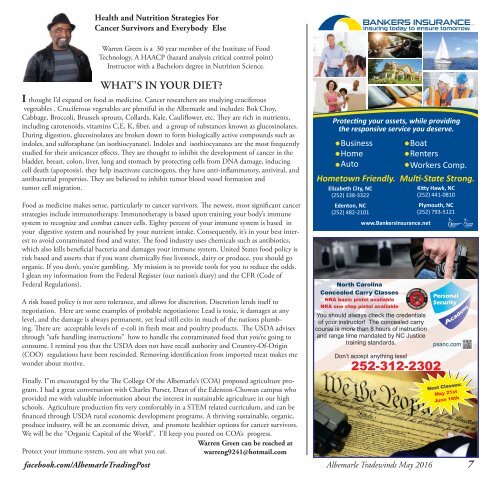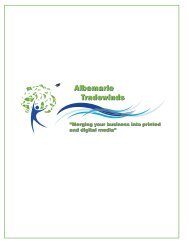Albemarle tradewinds May 2016 web Final
May 2016
May 2016
You also want an ePaper? Increase the reach of your titles
YUMPU automatically turns print PDFs into web optimized ePapers that Google loves.
Health and Nutrition Strategies For<br />
Cancer Survivors and Everybody Else<br />
Warren Green is a 30 year member of the Institute of Food<br />
Technology, A HAACP (hazard analysis critical control point)<br />
Instructor with a Bachelors degree in Nutrition Science.<br />
WHAT’S IN YOUR DIET?<br />
I thought I’d expand on food as medicine. Cancer researchers are studying cruciferous<br />
vegetables . Cruciferous vegetables are plentiful in the <strong>Albemarle</strong> and includes: Bok Choy,<br />
Cabbage, Broccoli, Brussels sprouts, Collards, Kale, Cauliflower, etc. They are rich in nutrients,<br />
including carotenoids, vitamins C,E, K, fiber, and a group of substances known as glucosinolates.<br />
During digestion, glucosinolates are broken down to form biologically active compounds such as<br />
indoles, and sulforaphane (an isothiocyanate). Indoles and isothiocyanates are the most frequently<br />
studied for their anticancer effects. They are thought to inhibit the development of cancer in the<br />
bladder, breast, colon, liver, lung and stomach by protecting cells from DNA damage, inducing<br />
cell death (apoptosis), they help inactivate carcinogens, they have anti-inflammatory, antiviral, and<br />
antibacterial properties. They are believed to inhibit tumor blood vessel formation and<br />
tumor cell migration.<br />
Food as medicine makes sense, particularly to cancer survivors. The newest, most significant cancer<br />
strategies include immunotherapy. Immunotherapy is based upon training your body’s immune<br />
system to recognize and combat cancer cells. Eighty percent of your immune system is based in<br />
your digestive system and nourished by your nutrient intake. Consequently, it’s in your best interest<br />
to avoid contaminated food and water. The food industry uses chemicals such as antibiotics,<br />
which also kills beneficial bacteria and damages your immune system. United States food policy is<br />
risk based and asserts that if you want chemically free livestock, dairy or produce, you should go<br />
organic. If you don’t, you’re gambling. My mission is to provide tools for you to reduce the odds.<br />
I glean my information from the Federal Register (our nation’s diary) and the CFR (Code of<br />
Federal Regulations).<br />
A risk based policy is not zero tolerance, and allows for discretion. Discretion lends itself to<br />
negotiation. Here are some examples of probable negotiations: Lead is toxic, it damages at any<br />
level, and the damage is always permanent, yet lead still exits in much of the nations plumbing.<br />
There are acceptable levels of e-coli in fresh meat and poultry products. The USDA advises<br />
through “safe handling instructions” how to handle the contaminated food that you’re going to<br />
consume. I remind you that the USDA does not have recall authority and Country-Of-Origin<br />
(COO) regulations have been rescinded. Removing identification from imported meat makes me<br />
wonder about motive.<br />
<strong>Final</strong>ly. I”m encouraged by the The College Of the <strong>Albemarle</strong>’s (COA) proposed agriculture program.<br />
I had a great conversation with Charles Purser, Dean of the Edenton-Chowan campus who<br />
provided me with valuable information about the interest in sustainable agriculture in our high<br />
schools. Agriculture production fits very comfortably in a STEM related curriculum, and can be<br />
financed through USDA rural economic development programs. A thriving sustainable, organic,<br />
produce industry, will be an economic driver, and promote healthier options for cancer survivors.<br />
We will be the “Organic Capital of the World”. I’ll keep you posted on COA’s progress.<br />
<br />
<br />
Business<br />
Home<br />
Auto<br />
Boat<br />
Renters<br />
Workers Comp.<br />
<br />
<br />
(252) 338-3322<br />
<br />
(252) 482-2101<br />
<br />
<br />
<br />
<br />
<br />
<br />
<br />
<br />
<br />
<br />
<br />
<br />
(252) 441-0810<br />
<br />
(252) 793-5121<br />
<br />
<br />
<br />
<br />
<br />
<br />
<br />
Warren Green can be reached at<br />
Protect your immune system, you are what you eat.<br />
warreng9241@hotmail.com<br />
facebook.com/<strong>Albemarle</strong>TradingPost <strong>Albemarle</strong> Tradewinds <strong>May</strong> <strong>2016</strong> 7

















